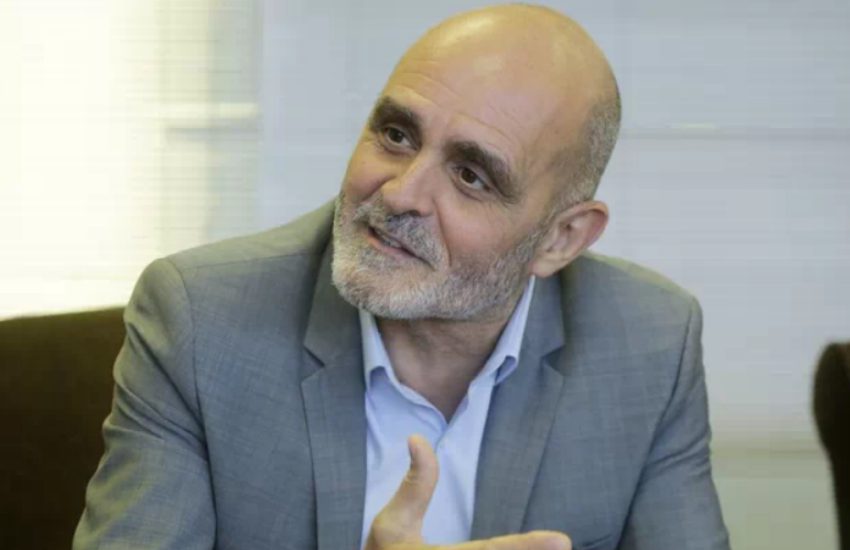Banking became part of the solution to the problem created by the pandemic. And now it also wants to do its bit in the crisis caused by the war in Ukraine. Alberto Aza, spokesperson for the Spanish Confederation of Savings Banks created by the latter (CECA), says that this sector could be key for the coming years, in which the channelling of European funds will be decisive.
What should citizens expect with regard to interest rates?
We are facing a scenario of rising interest rates and this is going to have an impact on the cost of financial products. But it will also have a favourable impact on savings products. They are going to be more profitable than what they were until then. In aggregate terms, there may be a compensatory effect. On the one hand, we will pay more for some products, but receive more for others. Families with mortgage loans are facing a scenario of great uncertainty. But if we adhere to what the markets are saying, the impact of interest rate increases will be manageable and bearable for families and businesses. It will be moderate.
Some question whether this is reversible, if we are going to return to the era of low interest rates.
The ECB's main remit is the fight against inflation with a target of 2%. Rates will evolve in line with how inflation evolves. Or perhaps we should say it the other way around. Inflation will evolve depending on the impact of monetary policy. And, depending on how this evolves, there could be a return to a lower interest rate scenario.
One of the factors that is having an impact on inflation is the energy component. In these circumstances, will central bank policy be effective in containing prices?
This is a supply-driven crisis caused by tensions in international energy and commodity markets. But also because of an increase in demand after the pandemic. And this combination causes this inflation. These are two forces that we have to see how they evolve. Funcas forecasts suggest that we could return to moderate inflation levels in 2023, but all these forecasts must be treated with great caution because we are facing a time of great uncertainty.
With rising rates, will mortgage applications come to a halt?
We have seen a significant upturn in recent months in mortgage applications in anticipation of these possible rate increases. But to the extent that these increases may be moderate, we believe that lending activity will continue. We will have to see how it adjusts.
And how will the banking sector be affected by all these rate increases?
We are emerging from a very prolonged scenario of negative interest rates. And this, during this period, has drastically narrowed the brokerage margins of the banking sector and has therefore significantly conditioned the banking business and its profitability. A scenario of rising interest rates may have a positive impact on the banks' brokerage margin. But we will never return to an interest rate scenario of the kind we knew a decade ago. Therefore, although the margin may be recovering, institutions will have to continue to seek efficiencies, which is what regulators have been insistently asking them to do since 2014.
COVID has also posed a challenge for the banking sector. Many changes have taken place in a short period of time. After these two years, is the banking sector sufficiently strengthened to face the challenges ahead?
Banking has played a key role during the pandemic, it has been part of the solution. This has been possible because during this crisis, banks have started from a position of financial solidity that has had nothing to do with that of previous decades. Today, banks are solvent, have no liquidity problems, have drastically improved their leverage, governance and risk management. It is true that the pandemic has had an impact, as in every other sector. In fact, the provisions made by the banks reflect the fact that they anticipated a potentially complicated scenario. But the reality is that today the sector has returned to pre-pandemic levels of solvency. It is in a position of strength to deal with the onslaught of the impacts of the Ukrainian war. The exposure of Spanish banks to Russia is very small, but it is true that as a country we will be exposed to the indirect effects of a crisis.
Banking has been a key player in the health crisis. Has it been a process of reconciliation with the public after what took place in 2008?
In the wake of the great financial crisis, banking has undergone a major transformation process at all levels. From solvency, to balance sheets, to governance... Banking today is very different. It has contributed by acting as a buffer during the pandemic and is playing a key role in our country's recovery. After two years of containment, families want to recover their financial projects, to find an outlet for their pent-up savings, to be able to buy a house or a car, and companies also need to grow and this requires financing. Nor should we lose sight of the fact that banks will play a key role with the arrival of European funds, because these funds, which will be public aid, will have to be complemented by private financing. And the banks will be there to co-finance these investment projects and to ensure that the desired multiplier effect is actually generated so that the impact of these funds is ultimately amplified in the real economy.
Periodically, we conduct an opinion poll with the opinion polling company GAD 3 to find out how the population is assessing the response of banks to different questions. And, in the case of the pandemic, the response was very satisfactory. The population was well aware that from the outset the banks accompanied families, SMEs and the self-employed by implementing containment measures such as the channelling of ICO loans and mortgage moratoriums. We received an 8 out of 10, which is a very good rating.
Is banking at risk of financial exclusion with all this digitalisation?
I believe the reflection would be as follows. It is evident that digitalisation is an opportunity for inclusion and accessibility in general in all services. It is also true that, despite the progress it can bring, it also comes at a cost in terms of the digital divide and affects more intensely older people who lack the necessary technological skills or resources. The problem of the digital divide is a common problem in all countries and affects a multitude of sectors. Not only financial services. It also affects health and education... This means that it is fundamentally a structural and national problem, not a sector-specific problem. It must therefore be solved with bold and effective public policies. However, despite this, the banking sector has refused to be left behind in the face of this challenge and has been the first sector to implement palliative measures to solve the problem of the digital divide and its consequences. Four months ago, the banks published a set of measures to strengthen service to the elderly and mitigate the impact of the digital divide. And they pledged to further strengthen financial and digital literacy programmes to enable the elderly to manage their finances with ease. Spain is one of the countries in the world with the highest rate of financial inclusion and this is something unknown. It has the second highest number of bank branches in the EU. ATM density is on a par with Germany and well above the European average, and we are the second most digitalised banking system in the world.
Digitalisation is also triggering a restructuring process in the banking sector, with workers affected by...
Banking is undergoing a profound transformation. Spain used to have an extreme density of branches and digitalisation has led to an oversized branch network. Customers prefer digital channels and in many cases no longer visit branches. Banks are in the process of adjusting their installed capacity and also of reducing branch and staff numbers. It is also true that the conditions of these restructurings are often among the most favourable in the labour market. Employees voluntarily join these programmes and then the banking sector is extremely active in outplacement.
Branches are closing but banks are responding with additional services; Such as buses, universal ATMs... This is important because the problem of depopulation of rural areas is a demographic phenomenon that is particularly intense in Spain. We must take into account that the digital divide is a national problem and, therefore, the banks cannot be held responsible for it. Especially when banks have long since set up alternative channels to service the population. Examples of this are the mobile branches, the financial agents that make it possible to continue with the bank branch or the agreements that banks have reached with non-bank agents such as the Spanish Postal Service. This is producing very satisfactory results. If you compare the coverage rate of the banking sector with others such as the health sector, pharmacies or the education sector, you can see that we are ahead of all of these sectors. Banks are often the last service providers to withdraw from rural populations. Schools, primary health care centres and supermarkets have already gone before. But in addition to being the last ones to leave, we have also developed alternative channels.
Do you think we will continue to see mergers?
Mergers take place because they allow for economies of scale and improved efficiencies for the banks. Our banks are much more efficient than those in European countries. We far exceed the average efficiency of the European Union. Taking this into account, it would appear that there is no need for further mergers. But if we look at the level of banking concentration we are at an intermediate level compared to the rest of Europe. Therefore, it cannot be ruled out; they are decisions specific to each bank. I believe that the big challenge is cross-border mergers. And this is something the ECB has been insisting on for a long time.
One of the great challenges still facing the sector are "fintech" firms.
We have always said the same thing. Fintech firms bring something to the table that is not only positive, but necessary: they encourage competition in the sector. In fact, an application such as Bizum has been developed in response to digital payment solutions and is today a benchmark in Europe. Bizum is a pioneering initiative of the Spanish banking sector that was developed collaboratively. However, what does not seem right to us is that these new competitors that are gaining market share from financial institutions are not subject to the same strict regulation that the large banking sector is subject to. Moreover, we have to bear in mind that all these regulations are ultimately aimed at protecting the customer.
In recent weeks, one of the most important economic news stories has been the crash of cryptocurrencies, what should be done with these assets?
Like any investment asset it needs to be monitored and regulated. It is a worrying issue because they are really very speculative assets and we are particularly concerned about how young people are reacting. We are very insistent on the need to make the population financially literate. It is an essential antidote to such bad investment practices and to the siren calls of investments such as cryptocurrencies. It is essential to build on this as digitalisation progresses. Especially among the younger population, who are used to moving comfortably within technological environments and who have become digital financial investors without the necessary knowledge. This makes them easy prey to be seduced by the gurus and, in the end, the consequences in some cases are proving to be disastrous.












